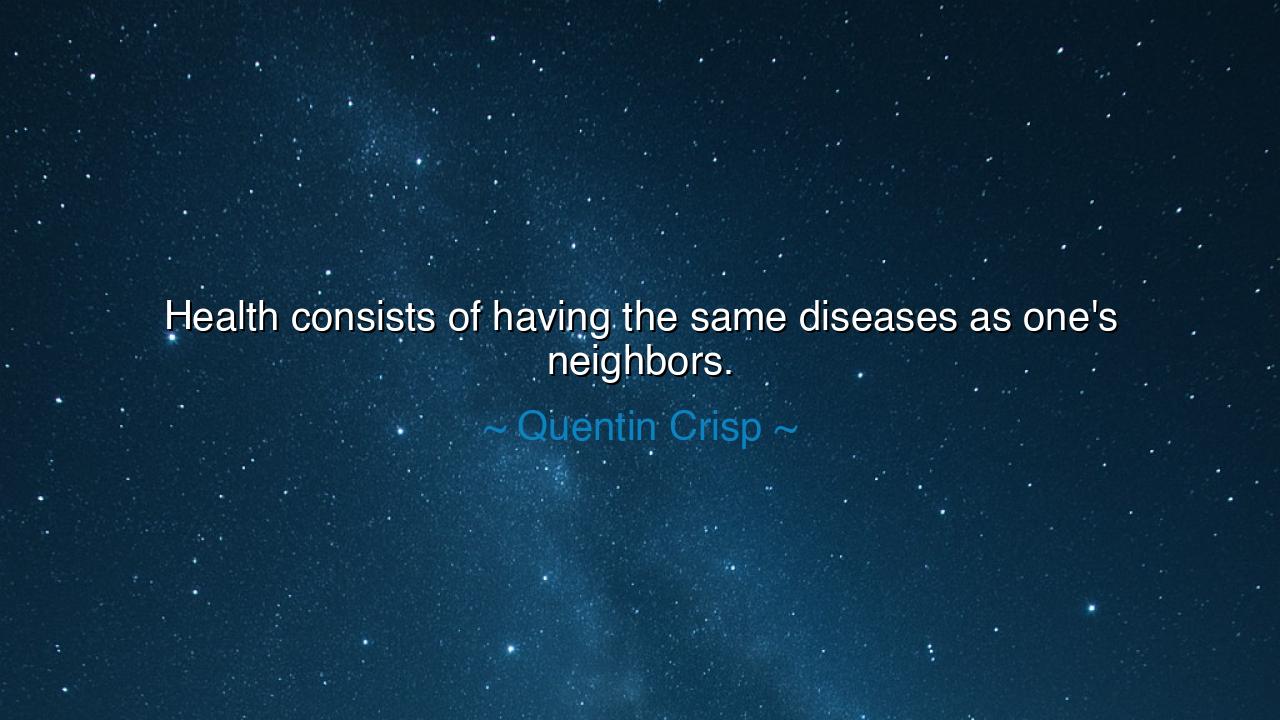
Health consists of having the same diseases as one's neighbors.






“Health consists of having the same diseases as one's neighbors.” — Quentin Crisp
Hear the voice of Quentin Crisp, the sharp-tongued philosopher of individuality and irony, who in this single line lays bare the illusion of what society calls normalcy. His words, cloaked in wit, carry the weight of wisdom: that much of what we deem health and sanity is not truth, but conformity. He reveals that men do not measure wellness by the natural balance of their bodies or minds, but by the resemblance of their sufferings to others. To be like one’s neighbors — to have their worries, their ailments, their obsessions — this is counted as health. To differ, to ail uniquely, or to stand apart, is treated as sickness. Thus, Crisp speaks not of medicine, but of the disease of the collective, where imitation replaces understanding, and agreement becomes the mask of well-being.
In the world of Quentin Crisp, a man who lived unashamedly as himself in an age that demanded obedience, such words are both confession and challenge. He had learned through pain that society often defines “health” not as the absence of disease, but as the presence of acceptable illness. To suffer anxiety, fatigue, or dissatisfaction in a world that glorifies them as the marks of productivity — this is to be “normal.” But to reject the race, to question the order, to live without disguise — that, to the crowd, is madness. Crisp saw through this theater of social approval and laughed, for he knew that much of what humanity calls health is simply shared delusion, dressed in polite smiles.
Consider, O listener, the tale of Socrates, the wise man of Athens, whose mind was far healthier than his city’s yet was condemned for corrupting it. His neighbors drank from the same cup of falsehoods, and thus they called themselves well. But when one man, sober with truth, refused to sip the poison of convention, they called him sick and dangerous. Socrates was executed for questioning the diseases of his age — ignorance, pride, and complacency. Yet history remembers him as whole, and his accusers as broken. So it is with all who dare to live in opposition to the collective illness of their time: they are called strange, unwell, or unfit, until the ages finally catch up to their vision.
Crisp’s humor conceals sorrow — the sorrow of one who saw people enslaved by imitation, mistaking collective sickness for health. To him, the office worker crushed by monotony, the parent suffocated by social expectation, the youth measuring worth through validation — all were considered “healthy,” for they suffered together. Yet the artist, the dreamer, the soul who sought peace outside these patterns, was labeled an outsider, a misfit. The irony is cruel: the truly well are treated as ill because their hearts refuse the common fever. Thus, Crisp’s quote is not cynicism but revelation — that true health, physical or spiritual, can never be measured by comparison.
In the modern age, this truth endures. Entire nations rise and fall in cycles of shared unrest. People scroll endlessly through glowing screens, losing sleep and self, yet feel comforted because everyone else does the same. They eat what harms them, breathe polluted air, chase hollow goals, and call it life. The sickness of the age is masked by numbers — “If all are unwell, then none are.” But the wise see through this illusion. The body does not heal by conformity, and the spirit does not thrive in imitation. Real health begins when one turns inward, listens deeply, and chooses a way not dictated by the crowd.
Let us then remember this: to be truly healthy is to be whole, and wholeness cannot be borrowed from one’s neighbors. It is forged by honesty — by listening to the rhythm of one’s own being, not the clamor of the masses. Sometimes this honesty will make you seem ill to those who live in quiet desperation. But the one who walks apart, though misunderstood, may walk in truth. To think for oneself, to care for oneself, to resist the diseases of greed, fear, and conformity — these are the medicines of the awakened soul.
The lesson of Quentin Crisp is timeless: beware of measuring your well-being by the sickness of others. Do not seek validation in the mirror of the crowd. Instead, seek balance in solitude, nourishment in authenticity, and health in the harmony of body and spirit. Dare to live differently, even if it means walking alone — for the path of truth is narrow, but it leads to freedom. And remember always: the world will call you “ill” when you stop sharing its fever, but that is the first sign that you are finally becoming well.






AAdministratorAdministrator
Welcome, honored guests. Please leave a comment, we will respond soon